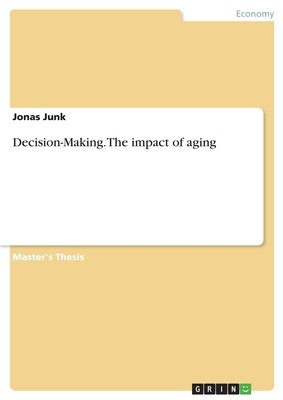
- We will send in 10–14 business days.
- Author: Jonas Junk
- Publisher: GRIN Verlag
- ISBN-10: 3346204561
- ISBN-13: 9783346204561
- Format: 21 x 29.7 x 0.4 cm, softcover
- Language: English
- SAVE -10% with code: EXTRA
Reviews
Description
Master's Thesis from the year 2019 in the subject Business economics - Miscellaneous, grade: 2.0, University of Münster, language: English, abstract: The world population gets older as life expectancy increases. The popula-tion of people over the age of 60 is expected to be over two billion in 2050 (cf. United Nations, 2017, pp. 13-14). Older adults (OA) still face decisions, which might be even more significant or complex than decisions of young-er adolescents. For example, the average age of C-suite members in Ameri-can firms is 54 (cf. Korn Ferry, 2007). On a more individual level, the pop-ulation aged 55 and higher has a significantly higher mean net worth than the younger population (cf. Bricker et al., 2017, p. 13). Especially, if one accounts for the fact that research has shown that declines in cognitive functioning are seen before the age of 50 (cf. Salthouse, 2004, p. 141), re-search on aging and decision making (DM) is of high importance. In recent years numerous papers on this topic were published. This thesis helps existing literature by creating a literature overview to summarize current findings. Because of the reasons above, this thesis concentrates on age-related differences between young and OA, but does not analyze re-search about DM in childhood. It adds to current literature by being the first work with an extensive overview of age-related changes in the respective analyzed biases with a short subsequent view on financial DM. The thesis deals with the research question, whether biases of DM literature differ between younger and OA. To answer this question, I examine differ-ences in typical DM biases. The chosen biases are the ones being investi-gated the most thoroughly in existing literature on aging and DM and wherever possible or necessary I will focus on DM in economic contexts. The remainder of this paper is organized as follows: section two gives a short overview about the foundations of DM. After examining age-related effects on pro
EXTRA 10 % discount with code: EXTRA
The promotion ends in 18d.16:42:14
The discount code is valid when purchasing from 10 €. Discounts do not stack.
- Author: Jonas Junk
- Publisher: GRIN Verlag
- ISBN-10: 3346204561
- ISBN-13: 9783346204561
- Format: 21 x 29.7 x 0.4 cm, softcover
- Language: English English
Master's Thesis from the year 2019 in the subject Business economics - Miscellaneous, grade: 2.0, University of Münster, language: English, abstract: The world population gets older as life expectancy increases. The popula-tion of people over the age of 60 is expected to be over two billion in 2050 (cf. United Nations, 2017, pp. 13-14). Older adults (OA) still face decisions, which might be even more significant or complex than decisions of young-er adolescents. For example, the average age of C-suite members in Ameri-can firms is 54 (cf. Korn Ferry, 2007). On a more individual level, the pop-ulation aged 55 and higher has a significantly higher mean net worth than the younger population (cf. Bricker et al., 2017, p. 13). Especially, if one accounts for the fact that research has shown that declines in cognitive functioning are seen before the age of 50 (cf. Salthouse, 2004, p. 141), re-search on aging and decision making (DM) is of high importance. In recent years numerous papers on this topic were published. This thesis helps existing literature by creating a literature overview to summarize current findings. Because of the reasons above, this thesis concentrates on age-related differences between young and OA, but does not analyze re-search about DM in childhood. It adds to current literature by being the first work with an extensive overview of age-related changes in the respective analyzed biases with a short subsequent view on financial DM. The thesis deals with the research question, whether biases of DM literature differ between younger and OA. To answer this question, I examine differ-ences in typical DM biases. The chosen biases are the ones being investi-gated the most thoroughly in existing literature on aging and DM and wherever possible or necessary I will focus on DM in economic contexts. The remainder of this paper is organized as follows: section two gives a short overview about the foundations of DM. After examining age-related effects on pro


Reviews